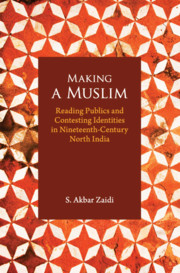1 - Who Is a Muslim? Identities of Exclusion
Published online by Cambridge University Press: 24 March 2021
Summary
One of the dangers of looking back at the past from a particular historical moment in time is the tendency to conjure and imagine the existence of communities which may not have actually existed in that form at that particular juncture. Certain ‘end-events’ such as Partition may lead scholars to try to locate the beginnings of a separatism within a particular community and may lend it features and characteristics that only emerge as a consequence of looking back. Such a ‘reconstruction’ loses the specific context in which much was said and written, giving meaning derived under very different, later, contexts. What a community is, when a ‘nation’ emerges or when identities of a particular time emerge—and change—are complicated processes. Importantly, who decides what or who a community is or when certain labels are imposed are also not insignificant. Whether categories are self-consciously chosen or imposed from the outside, often in the name of the instruments of governmentality or the certification of some others outside authority, they all have a bearing on becoming. Fortunately, some recent scholarship has been rather more cautious regarding these kinds of assured claims.
In the context of nineteenth-century India, some modern scholars begin to find two separate ‘nations’ as early as in the middle of the century, where ‘Muslims’ and ‘Hindus’ are often seen as largely homogenous entities where sharp differences and divisions within such very broadly defined categories are ignored and made to collapse into a single category. The question ‘when was separatism?’ might be an interesting question worth asking, but it gives rise to far too many speculative answers not worthy of our serious consideration.
The use of the term ‘Muslim’ in this book, and in scholarship more generally, often glosses over the very expansive yet exclusionary notion of who a Muslim is or could be, universalising a category that is highly fractured and contentious both for scholars and particularly for those being labelled as such. Not only that, but the self-conscious declaration of individuals or even communities of a particular type of belonging, necessarily excludes others who may make the same claims.
- Type
- Chapter
- Information
- Making a MuslimReading Publics and Contesting Identities in Nineteenth-Century North India, pp. 30 - 78Publisher: Cambridge University PressPrint publication year: 2021



